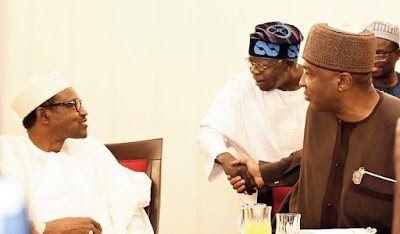By Paul Onomuakpokpo
It is a Monday
morning. President Muhammadu Buhari has just resumed in his office after his
over two months’ medical vacation. He would have loved to have more rest. But
he has been inundated with tales of the intrigues to take over his job. He just
has to muster every ounce of energy to take back his office. A file is
presented to the president. In it is a list that contains the names of those
who were hell-bent on scuttling his presidency while he was away. On the list
are ministers. There are also special aides and other officials in the
presidency. All these are to be sacked. Welcome to the post-London Buhari era
in Aso Rock.
 |
| *Buhari |
The criteria for the mass cleansing are only
clearly known to the helmsman of Aso Rock. However, Prof. Yemi Osinbajo who was
the Acting President while Buhari was away is not on the list. He has been
found extraordinarily loyal despite all the machinations and intrigues of some
people to intimidate and blackmail him into resigning, Buhari considers him as
having judiciously represented his interest while he was away. What exemplifies
Osinbajo’s fidelity to Buhari’s vision is his maintaining the position of the
president that the acting Chairman of the Economic and Financial Crimes
Commission (EFCC) could remain in office till 2019 despite his not being
confirmed by the Senate. Again, Osinbajo refused to succumb to the clamour for
restructuring that ruled the polity.
Buhari has always believed that nobody should
tweak the structure of the country as it is. He is on the same page with former
President Olusegun Obasanjo who also fought the civil war to keep the country
together. But as for former Military President Ibrahim Babangida, Buhari would
respond to him appropriately at the right time for taking a position on
restructuring that is different from that of the president. Of course, former
Vice President Atiku Abubakar has always been coveting the president’s job. But
there is a way to also pay him for turning himself into a jackal.



















